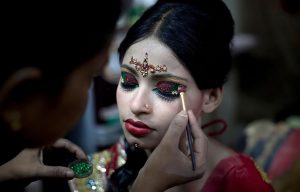During my field work in Bangladesh child marriage became evident throughout villages. Coming from my comfortable world in Ireland this was difficult to digest. But during my data collection, while not ignoring the issue, I put my emotions to side. Now re-examining my data I felt the need to share some information regarding this, difficult to come to terms with, cultural norm.
It is illegal in Bangladesh to marry under the age of 18 for a woman and under 21 for a man unless special permission is sought from a court. Despite this children get married on a daily basis. Child marriage impacts largely girls when compared to boys. A UNICEF report released in 2014, showed that 60% of women in Bangladesh between the ages of 20-24 were married before they were 18 and one in five of those women were married before the age of 15. Girls marry men up to twice there age and give birth within the first year of marriage. A key determinant for the ongoing widespread child marriages is the use of dowry meaning the exchange of money or some valuable asset for the marriage of the daughter or son. Child marriage is more likely to occur in rural, poor areas and girls are more at risk in Muslim communities. Child marriage is against human rights of a child and is against international law. Child marriage leaves a child vulnerable to abuse, violence and exploitation.
My experience speaking with child brides exposed me to stories of young women living lives of hard labor, no choice to pursue education or in becoming mothers. The ‘lucky’ child brides get married off to a respectful man. One women explained she was married at the age of 15 but that she is happier now. She now has more freedoms than she had when living with her father and mother where her life was difficult. She explained she was lucky that her husband was a good man. Lucky is not a word that I would think of putting into the same sentence as child marriage.
Through decreasing child marriage an increase in girls receiving a higher level of education is predicted. And as we are aware an increase in girls education can have numerous positive knock on effects including increasing food and nutrition security and climate change adaption.
Some research I came across that looks at child marriage specifically in Bangladesh highlights the most common factors at an individual, community and household level whereby child marriage predominately occurs.

